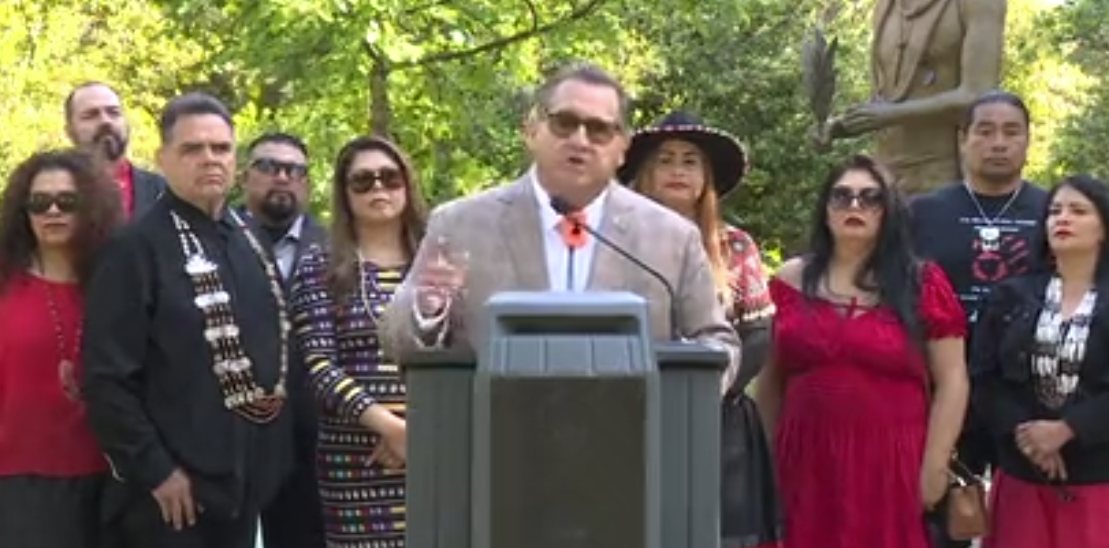
- Details
- By Native News Online Staff
Tribal leaders, lawmakers from both parties, and advocates gathered at the California State Capitol today to honor Missing and Murdered Indigenous People (MMIP) and to recommit to ending violence on tribal lands. The daylong series of events included a hearing of the Select Committee on Native American Affairs and will conclude with a powerful evening vigil featuring cultural songs, speeches from victims' families, and a video message from First Partner Jennifer Siebel Newsom.
Assemblymember James C. Ramos (D-San Bernardino), chair of the California Legislative Native American Caucus, emphasized the urgency of the crisis: “California ranks among the worst in the nation for unresolved and uninvestigated MMIP cases. According to the National Congress of American Indians and the National Institute of Justice, more than 84% of Native American women have experienced violence in their lifetimes. This level of trauma is unacceptable.”
Two California tribes—the Yurok Tribe and the Coyote Valley Band of Pomo Indians—have declared states of emergency in recent years due to the high number of missing persons. The Yurok Tribe made their declaration in December 2021, while Coyote Valley followed on April 25, 2024.
Data from the National Institute of Justice reveal that:
-
56% of Native women have experienced sexual violence,
-
75% of those affected endure such violence more than once.
In 2016, the National Crime Information Center recorded 5,712 missing Native American and Alaska Native women and girls in the U.S., yet only 116 cases were entered into the National Missing and Unidentified Persons System.
At the morning press conference, Ramos led a hearing to address the challenges tribal communities face in protecting their members. A key issue discussed was the impact of Public Law 280, a 1953 federal statute that shifted criminal justice responsibility to six states, including California. Ramos noted that the law has created jurisdictional confusion and undercut public safety. “Cities and counties have fewer law enforcement partners to rely on when emergencies arise,” he said. “And these six states consistently report the highest numbers of unresolved MMIP cases.”
The hearing featured testimony from tribal leaders and public safety officials, including:
-
Chairperson Antoinette Del Rio (California Valley Miwok Indians)
-
Chairperson Cheyenne Stone (Big Pine Paiute Tribe of the Owens Valley)
-
Chairperson Charles Martin (Morongo Band of Mission Indians)
-
Chairman Joe James (Yurok Tribe)
-
Professor Carole Goldberg (UCLA School of Law)
-
Acting Director Isaac Borjorquez (Office of Attorney General Rob Bonta)
-
Humboldt County Sheriff William Honsal
-
San Bernardino County Sheriff Shannon Dicus
-
Cahuilla Councilwoman Samantha Thornsberry
-
April McGill (Yuki, Wappo), American Indian Cultural Center of San Francisco
-
Virginia Hedrick (Yurok Tribe member, Karuk descendant), California Consortium for Urban Indian Health
The day will culminate in a candlelight vigil on the Capitol grounds, where the dome will glow red in solidarity. Hundreds are expected to gather for the emotional event, honoring the lives lost and standing together in a call for justice and systemic change.
Editor's Note: This story has been updated to reflect April McGill's correct affiliation with the American Indian Cultural Center of San Francisco and to add Virginia Hedrick of the California Consortium for Urban Indian Health, who was also present at the event.
More Stories Like This
Native News Weekly (August 25, 2024): D.C. BriefsNavajo Nation Mourns the Passing of Former Vice President Rex Lee Jim
Deb Haaland Earns Endorsement From Communications Workers of America Local 7076
University Soccer Standout Leads by Example
Two Native Americans Named to Democratic Congressional Campaign Committee's“Red to Blue” Program
Help us defend tribal sovereignty.
At Native News Online, our mission is rooted in telling the stories that strengthen sovereignty and uplift Indigenous voices — not just at year’s end, but every single day.
Because of your generosity last year, we were able to keep our reporters on the ground in tribal communities, at national gatherings and in the halls of Congress — covering the issues that matter most to Indian Country: sovereignty, culture, education, health and economic opportunity.
That support sustained us through a tough year in 2025. Now, as we look to the year ahead, we need your help right now to ensure warrior journalism remains strong — reporting that defends tribal sovereignty, amplifies Native truth, and holds power accountable.
 The stakes couldn't be higher. Your support keeps Native voices heard, Native stories told and Native sovereignty defended.
The stakes couldn't be higher. Your support keeps Native voices heard, Native stories told and Native sovereignty defended.
Stand with Warrior Journalism today.
Levi Rickert (Potawatomi), Editor & Publisher

